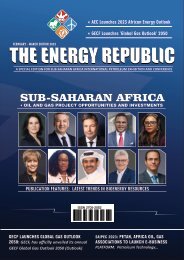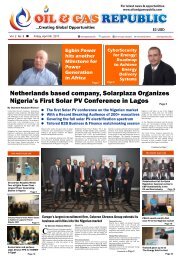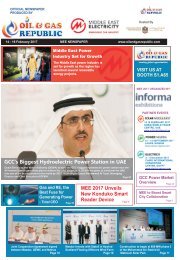OGRepublic August Edition
This edition is focused on Shell Nigeria Exploration and Production Company 'Digital Twin' for its Bonga FPSO.
This edition is focused on Shell Nigeria Exploration and Production Company 'Digital Twin' for its Bonga FPSO.
Create successful ePaper yourself
Turn your PDF publications into a flip-book with our unique Google optimized e-Paper software.
AFRICAN ENERGY
Ethiopia Diversifying its Energy Sector Towards Hydropower,
Renewables, Wind Energy
E
thiopia has developed a national
strategy programme that guides the
diversification of the country's overall action
plans towards the utilisation of its energy
resources.
The Special Advisor to Ethiopia’s Minister of
Water Irrigation and Energy, Hizkyas Dufera,
disclosed this at the virtual Energy Advance -
Africa Energy Series with the theme,
"Financing the Energy Transition Across Sub-
Saharan Africa".
Dufera said that based on Ethiopia's geographic
location of its infrastructure, it
estimates that about 65% of the country's
population will be connected to the grid,
while 35% will be using renewable energy
and offgrid solutions.
According to him, Ethiopia has about 45%
electrification rate, noting that 50% of its
population need to be connected to
electricity.
On the grid side, he said, it is divided into
three areas which are; Generation,
Transmission and Distribution.
"For Generation, we have policies in place.
We plan to develop all future generation
power plants and investing in the private
sector.
"Our overall strategy in Ethiopia is to
electrify 95% of our population with Hydropower
and diversify our energy mix towards
climate change.
"Our water levels reduced due to climate
change. We are diversifying to other energy
sources. Our strategies is to develop
Geothermal, Wind, and Solar Energy," he
said.
On the transmission side, he explained that it is
mostly for the public sector to develop.
"We are looking at Public Private Partnership
(PPP) modality in form of Independent Power
Transmission (IPT) systems.
"Our Distribution sector has recently opened up
for local private and international investors.
"We have established the enabling environment
to attract investments.
"About 8.2 million households will be connected
to the grid which means that people who leave
two and half kilometres from our infrastructure
scheme will be connected with our grid
extensions.
"We have started offgrid initiatives which are
divided in three main areas. The first one is minigrids,
solar home systems, institutional solar
solutions for schools, health sector, and public
institutions.
"On the minigrid side, we have a strategy into
three modalities. One of them is the public sector
implementation which we have innagurated up
to 12 projects and they are operational. About 25
projects are under design and will be
commissioned by the end of this year.
"We have secured $400 million funding from the
World Bank which will enable us scale up our mini
and offgrid sector.
"Our second modality for mini-grids is the Public
Private Partnership (PPP) where we leverage the
opportunties in the private and public sector. For
example, our public utility is very good in building
distribution systems at very low cost.
"We want to build partnership where there will be
a willing tariff arrangement with the private
sector to use the distribution system. The private
sector will develop the generation.
"We want to secure and reserve the highly
productive use areas for the private sector and
the rest for the public sector because we want to
reduce subsidy to make sure that the financing
that we receive is properly managed to achieve
our objectives.
"For solar home systems, we have a strategy to
deploy solar home sytems effectively. One of the
things we are adopting is the pay-as-you-go
systems to reduce the cost.
"Our energy sector value chain is too long which
presents opportunities for manufacturers,
distributors, importers, micro finance
institutions.
"We will be deploying solar home systems where
people will be connected at a reduced cost in
certain communities.
"We are also working with corporatives with very
strong operational financial strengths.
"For institutions, we will be deploying utilities to
procure EPC contracts.
"For e-mobility, we spend more than $3 billion per
year to import fuel in Ethiopia. But we can
leverage a low cost electricity through renewable
energy based infrastructure.
"We are spending more than 90 percent on
energy for cooking which is based on burning
wood that can be transited to electric cooking. It
will go a longway in saving the environment and
increasing revenue for the private sector," he
added.
18
OIL AND GAS REPUBLIC I SPECIAL EDITION















